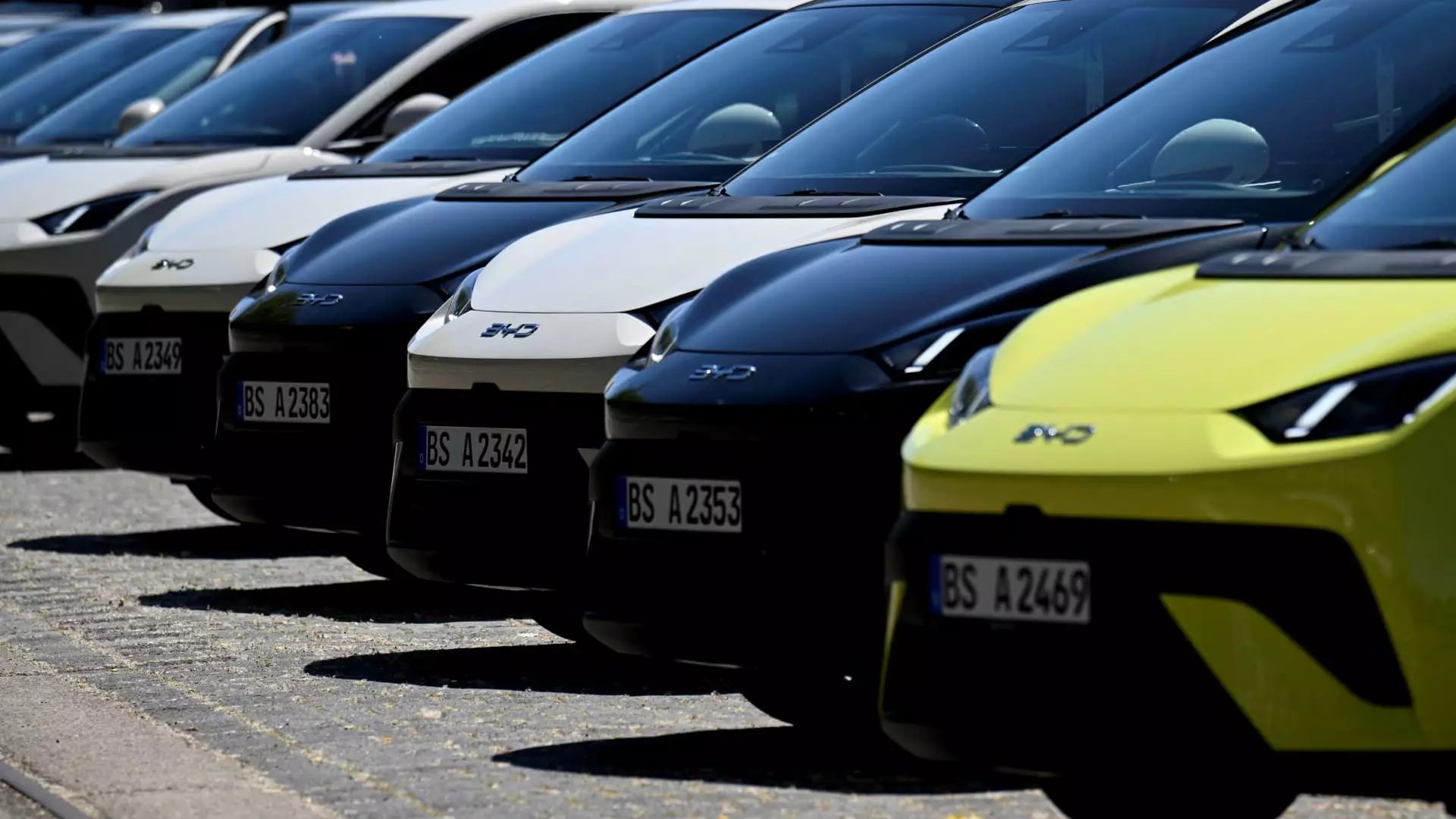The landscape of China’s electric vehicle (EV) market is transforming at breakneck speed, caught in the tumultuous waves of a price war that shows no signs of abating. Companies are grappling with monumental survival challenges as discounts and aggressive pricing strategies become the order of the day. Tesla, once regarded as the unassailable leader in this burgeoning sector, has experienced a disconcerting 15% drop in sales according to recent statistics from the China Passenger Car Association. This decline is not merely a ripple in the market; it’s a chilling reminder of how quickly fortunes can change in an industry that is increasingly dominated by local competitors like BYD, which, despite slowing growth, manages to hold onto its market lead by volume.
As analysts from CLSA warn, the vicious cycle of price competition is likely to escalate in the weeks ahead, with BYD struggling to meet its ambitious sales targets. The juxtaposition of Tesla’s declining sales against BYD’s underwhelming performance raises critical questions about the sustainability of such aggressive pricing tactics. It underlines a deeper industry narrative about the fragility of market dominance and the precarious balance companies must strike to remain viable.
BYD vs. Geely: The Clash of Titans
In a landscape dominated by price cuts, BYD’s struggle is particularly stark. However, the sector’s intrigue deepens with Geely emerging as a formidable contender. Analysts are optimistic about Geely’s position, arguing that its diverse portfolio, which includes brands like Galaxy and Zeekr, allows it to strike a delicate balance: optimizing internal structures while remaining competitive on price. This strategic positioning might not only protect Geely from the worst excesses of the price war but could also position it for enduring success.
Geely’s approach to targeting BYD’s popular models underlines an emerging trend in the market: competitors are no longer merely following; they are actively outmaneuvering each other. With Chinese consumers increasingly price-sensitive and looking for superior specifications, Geely’s focus on value enhances its appeal. Analysts projecting upward price targets for Geely suggest that the stock’s potential for growth remains robust, even amid broader market turmoil.
The New Players Stepping Up
While established giants like BYD and Tesla grapple with fluctuating sales, fresh blood in the EV sector is gaining traction. Xpeng, a rising electric car startup, has been making headlines with impressive delivery numbers, outpacing its peers for several months running. With strategic innovations like an enhanced driver assist system and new product launches, Xpeng demonstrates an agility that older companies struggle to replicate. Analysts hold a highly favorable view of Xpeng, calling it a promising investment given its projected share gains in a fast-evolving market.
Furthermore, companies like Leapmotor and Li Auto are rising to the challenge by maintaining a robust performance despite the sector’s volatility. While Leapmotor displayed a stable market share, it also reported a loss in the first quarter, signifying the inherent risks of aggressive growth strategies. On the other hand, Li Auto’s impressive product lineup, particularly its hybrid models that extend battery life, positions it distinctly away from the cutthroat pricing war. This divergence in strategy offers a roadmap for sustainability that eludes many of its competitors, suggesting that premium offerings can indeed weather the storm of rampant discounting.
Global Implications and Concerns
The implications of this price war extend beyond national borders; they resonate throughout the global auto market, threatening to flood regions like Europe with low-cost EVs. This prospect has raised alarms among regulators and industry stakeholders alike, prompting potential tariffs aimed at safeguarding local markets from an influx of cheaper imports.
Such protective measures highlight the socio-economic ramifications of aggressive competition in the EV sector. On one hand, an affordable EV can democratize green technology; on the other hand, it poses a serious threat to domestic manufacturers outside of China. The dilemma reflects a broader narrative about global capitalism: as companies strive for dominance, the very survival of established brands in other nations hangs in the balance.
As China navigates this treacherous terrain, the specter of market consolidation looms large. The prevailing sentiment among industry experts suggests that stability may emerge from the chaos. With production capacity significantly outstripping demand, companies may need to either innovate their offerings to entice buyers or scale back production to align more realistically with market appetite. The path forward is rife with uncertainty, and while optimism can be found, it exists in a precarious balance against a backdrop of cut-throat competition and evolving consumer expectations.


Leave a Reply